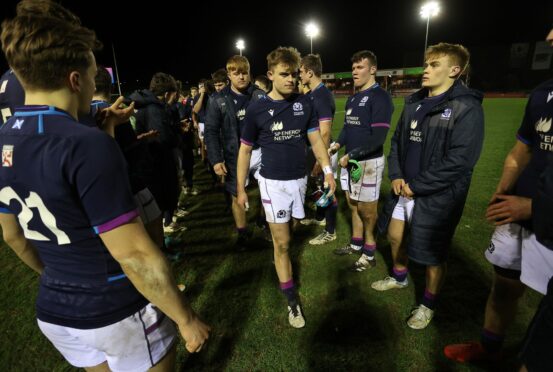Scottish Rugby have rebuilt their development schedule to prevent the “baptism of fire” that saw the national Under-20 team crash to a whitewash in this year’s Six Nations.
The young Scots lost all five games in the spring, culminating in a 59-5 humiliation to Grand Slam winners Ireland in their final game. But many of the squad were jumping straight from amateur club rugby or Covid-induced shutdowns to playing against the best young players in Europe.
The schedule of games leading into next year’s Six Nations – including greater involvement in the semi-pro Super6 competition – will be fit for purpose to deliver the young Scots with a foundation to be competitive.
Few of the Under-20 played any games in the 2021 Super6 competition, meaning many went straight from club games or long lay-offs due to Covid straight into the Six Nations.
‘It’s probably been the toughest’
Full-Time | Hosts Ireland claim the Grand Slam as they prove too strong in Cork. #IREvSCO | #SixNationsU20 pic.twitter.com/A22rfKPw1u
— Scottish Rugby (@Scotlandteam) March 20, 2022
“I think for this group of U20s and the U19s it’s probably been the toughest,” he said. “Because of Covid, they’ve missed out on a lot of international rugby experience and a lot of training.
“Remember, we couldn’t even train at times. Some guys were going out and playing their first real game of proper rugby (for months) in the Six Nations. It was a real baptism of fire for some guys.”
That won’t happen again, especially Under-20 players not getting games in Super6, which was primarily designed as a bridge between club and pro rugby for them.
“We want our emerging players operating at as high a level as possible, and I think that is where we need to be strong as a rugby community,” continued Murray.
“We’ve got to be pushing the ceiling up for young guys. So when they make the transition from club level to under-20s it isn’t as much of a jump.
“Super6 has been good to a certain extent this year. The coaches have bought into it. When you get down to having to win games, a young and relatively inexperienced player is likely to lose out to an older, more experienced player.
“We’ve met with the coaches and talked about what our shared vision is for Super6. We agreed that we want to make it a good product that people want to come and see.
“But you could argue that if it is not there to help our best young players then what is the point in having it?”
‘We need some pushing the case of younger players’
Scottish Rugby are delighted to welcome Kenny Murray.
Murray will make the move to BT Murrayfield to take up the new role of Head of Player Transition.
Read more: https://t.co/IO35P2uegU pic.twitter.com/XKpBiMX95y
— Scottish Rugby (@Scotlandteam) January 18, 2022
Murayfield’s head of performance Jim Mallinder admitted he and Murray had clashed over players’ opportunities in Super6.
“Kenny is fantastic because he is fighting the cause of those younger players,” said Mallinder. “He’ll come to me and we’ll have some awkward conversations.
“He’ll bollock me on a Monday morning for not allowing one of the under-20s to start in Super6 because one of the pro players is starting. That’s good because we want that competition and the hunger that creates.
“We need someone pushing the case of those younger players and Kenny is on it.”
Next year, the Under-20s will play more in the Super6 competition in August to October. Then specifically age-grade games plus warm-ups against A teams from Glasgow and Edinburgh will be played in December and January.
“We’ve got a nice, neat competition window that should take our under-20s on an upward slope leading into the Six Nations,” said Murray.
“I think that’s something we’ve not done as well in recent years, getting those games into place early enough. But we’ve got the two pro teams on board with that, and it will really help our guys. When we go to play the Six Nations we will be much better prepared.
“We need to make sure we have fit for purpose players to cope with U20 rugby. U20 is bloody hard, physically and in game intensity. I don’t believe we’re maybe as conditioned as we need to be to play under-20 rugby.”
